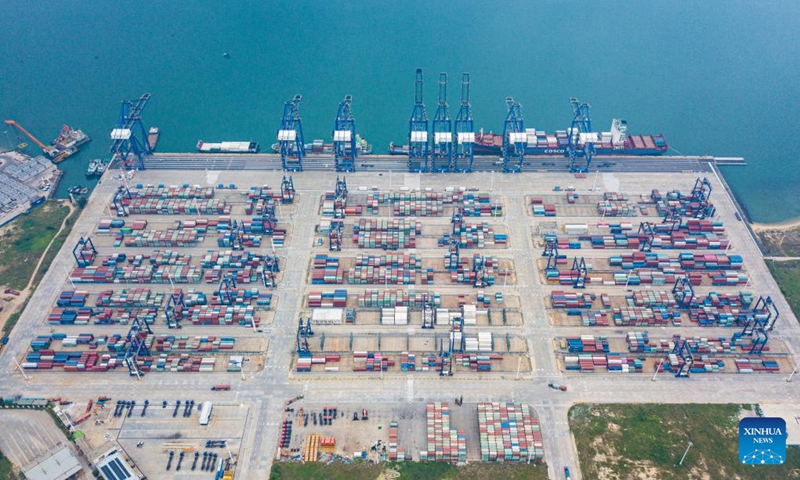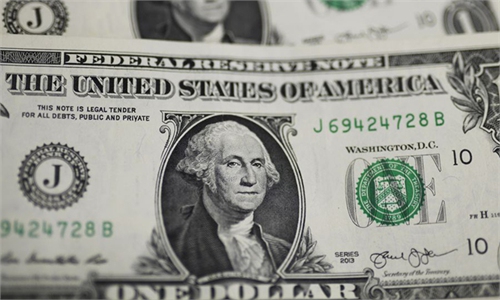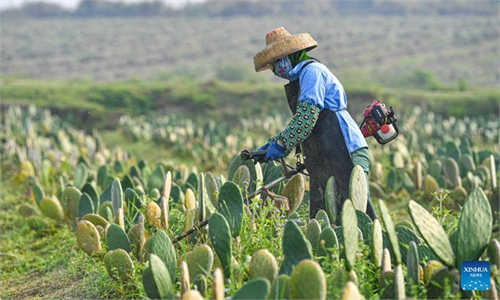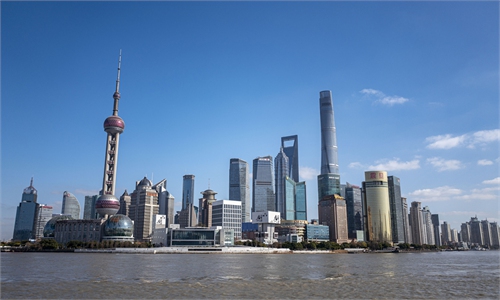Global focus turns to China’s two sessions for relief amid economic woes
Personnel changes, policy measures to boost confidence in economy

Tourists visit a commercial street in Yuzhong District in southwest China's Chongqing Municipality, Feb. 10, 2023. Chongqing has launched a variety of activities at nighttime to boost night economy since the beginning of this year.(Photo: Xinhua)
As recession warning signs continue to flash for the global economy, particularly in some advanced economies, Chinese and overseas markets and businesses are turning their eyes to one of China's most important political events scheduled to start later this week, searching for positive signals from the world's second-largest economy.The 14th National People's Congress (NPC) will open its first annual session in Beijing on March 5, 2023. The first session of the 14th National Committee of the Chinese People's Political Consultative Conference (CPPCC) will begin on March 4, 2023, also in Beijing. During what is collectively known as the two sessions, Chinese officials are set to release a set of social and economic development goals for the year, including an annual GDP growth target, and various policy measures to achieve them.
This year's two sessions have already attracted widespread domestic and global attention due to a confluence of factors, including a global economic downturn, China's ongoing solid economic recovery after claiming victory against COVID-19, and the fact that 2023 is a crucial year in China's social and economic development and political agenda following the successful conclusion of the 20th National Congress of the Communist Party of China (CPC) in October 2022.
Already, foreign media have been speculating about potential personnel changes as well as social and economic development goals and policies during the upcoming two sessions. Generally, higher economic targets and intensified policy measures are expected, offering a significant boost for the troubled global economy, according to analysts and recent tone-setting meetings and official statements.

This aerial photo taken on Nov. 5, 2022 shows a view of the Yangpu international container terminal in the Yangpu Economic Development Zone, south China's Hainan Province. After exceeding 100 billion yuan (about $14.92 billion) for the first time in 2021, the total import and export value of Hainan Free Trade Port exceeded 200 billion yuan (about $29.84 billion) to reach 200.95 billion yuan (about $29.98 billion) in 2022, an increase of 36.8 percent. (Xinhua/Pu Xiaoxu)
Top agendaAmong the most closely watched items on the agenda of this year's two sessions are potential changes to the leading positions of state institutions.
On Sunday afternoon, the 20th Central Committee of the CPC started its second plenary session, which reviewed a draft plan on reform of Party and state institutions, and the proposed name lists of candidates for the leading positions of state institutions to be recommended by the Political Bureau of the CPC Central Committee to the first session of the 14th NPC and candidates for the leading positions of the National Committee of the CPPCC to be recommended to the first session of the 14th National Committee of the CPPCC, Xinhua reported.
"During the two sessions, the new government team is expected to send a policy signal of resolute economic recovery, which will stimulate market confidence," Qiu Xiang, co-chief strategist of CITIC Securities, wrote in a research note shared with the Global Times on Thursday.
Beyond personnel changes, a leading item on the agenda of the two sessions each year is the various social and economic development targets included in the Government Work Report. In 2022, the official growth target was set at around 5.5 percent. But due to a slew of challenges, including the COVID-19 epidemic and weakening external environment, China's GDP growth rate fell short of the target but still achieved the hardwon 3 percent, outshining most other major economies including the US, Japan and Germany in 2022 and with the economic output topping the 120-trillion-yuan mark for the first time.
However, as China lifted anti-epidemic measures and declared victory against COVID-19, the Chinese economy has embarked on a fast recovery track, reflected in a growing number of indicators, including increased consumption and expanded manufacturing activity. As such, many domestic and foreign institutions are expecting a GDP growth rate of above 5 percent in China this year. The International Monetary Fund, for example, forecast a 5.2 percent-growth compared to a 2.9-percent global growth.
"I think it is more likely that the growth target will be set at above 5 percent this year," Xi Junyang, a professor at the Shanghai University of Finance and Economics, told the Global Times, noting that while a faster growth rate is expected, there are other policy targets, including sustainable and high-quality growth, instead of pure speed. "Stability is the key theme, and policy intensity will likely be moderate."
A series of recent top meetings and official statements also underscored the importance of stability. For example, the tone-setting Central Economic Work Conference in December demanded "making economic stability a top priority and pursuing steady progress while ensuring economic stability" for 2023, while eyeing "an overall recovery and improvement." At the conference, top leaders also called for the boosting of domestic demand, enhancing of technological self-reliance and strength and prevention of major risks.
Policy priority will be centered around these themes, while specific market sentiment-boosting measures in the financial and real estate sectors can be expected this year, Li Daxiao, chief economist at Shenzhen-based Yingda Securities, told the Global Times. "At the two sessions each year, there are often major policies for the development of the capital markets, and this year is not likely to be an exception," Li said.
There are growing expectations for the establishment of a working mechanism to maintain financial stability. A draft law on financial stability submitted to the Standing Committee of the NPC in December stipulates the establishment of a working mechanism to maintain financial stability, the strengthening of the mechanism to prevent and defuse financial risks, the clarification of the division of responsibilities to handle financial risks, and improved response measures to financial risks.
While it remains unclear whether the law will be adopted at the upcoming two sessions, the move follows several recent measures to boost the sound development of China's capital market, including the rollout of an across-the-board registration-based initial public offering (IPO) system and revised regulations for Chinese firms' overseas listings, with the latter scheduled to take effect on March 31.
Global expectations
Meanwhile, another top priority for China's economic development this year is expanding foreign trade and foreign investment. The Central Economic Work Conference in December also demanded greater efforts to attract and utilize foreign capital. Specifically, the meeting called for wider market access, opening-up of modern services industries and for foreign-funded firms to be granted national treatment.
During the two sessions, the Government Work Report will also likely touch on measures to support the export sector amid weakening external demand and further boost foreign investment, helping lift global expectations and inject a sense of stability in a troubled world, analysts noted.
Asked by the Global Times about plans to further boost foreign investment on Thursday, Shu Jueting, a spokesperson for the Chinese Ministry of Commerce (MOFCOM), said that the ministry will continue to use a special working mechanism to assist corporate executives to come to China for business talks.
The headquarters of dozens of multinationals have already made relevant arrangements with MOFCOM for business inspection trips to China, according to Shu.
This also reflects the growing interest among foreign businesses in expanding into the Chinese market. In January, foreign direct investment into the Chinese mainland grew 14.5 percent year-on-year to $127.69 billion, according to MOFCOM.
Many foreign businesses, including those from the US, have already announced plans to expand in the Chinese market. For example, US coffee-chain Starbucks said it aims to increase the number of its stores in China to 9,000 and double its net income in China by 2025, the company said in a statement shared with the Global Times.
Boosting market expectations is also a top priority for China's economic policymaking this year, according to analysts and recent top meetings. An executive meeting of the State Council on Thursday on handling proposals and suggestions made during the two sessions called for various measures to boost market expectations and consolidate the momentum of economic growth stabilization and recovery.





